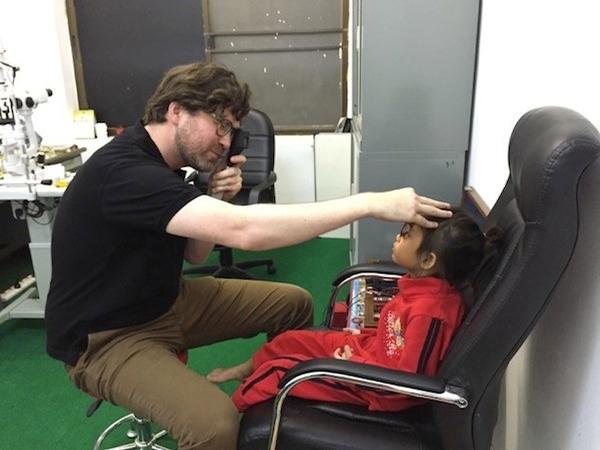
Cambodian Children to Benefit from Kiwi Eye Specialist's Expertise
12 March 2015, 2:51PM
Impact PR
A New Zealand ophthalmologist is using his expertise to help train an eye surgeon in Cambodia to deal with hundreds of needy children in the developing nation.
Dr Stuart Carroll of Auckland Eye recently spent a week with a local ophthalmologist in Phnom Penh, whom he taught essential skills for treating children’s eye disease and irregularities.
The trip, which was organised by non-profit organisation Sight For All, allowed Dr Carroll to see first-hand the challenges faced by eye specialists working in Cambodia, and put his own expert knowledge to use in helping to treat some young patients.
“There are a lot of challenges faced by doctors in Cambodia: there is no public healthcare so patients need to fund treatment themselves, there are no centralised medical records, and it can be very difficult to reach people for follow-up care and appointments,” explains Dr Carroll.
“Because of those challenges, many of the children I treated were suffering from more advanced cases of eye diseases than I would see in New Zealand. Their parents have been unable to access or afford treatment early in life or when their eye problems first started to occur, and so they become more challenging to treat because of their late presentation,” he says.
Dr Carroll is working specifically with local ophthalmologist, Dr Kheng Sok, with the aim for her to become a leading paediatric eye specialist in Cambodia. Other doctors from Australia and New Zealand involved with the Sight For All programme take turns visiting the hospital to help with her training – something that will provide long-term specialty skills for needy children in the country.
“As a specialist in New Zealand, we complete our training here, and usually we then go and work in another country or two to learn from some of the best before returning here to work,” says Dr Carroll, who spent a year in London and a year in Melbourne after completing his vocational training.
“However for doctors like Dr Sok, the cost of doing that, along with the English language requirements of many countries for practicing medical professionals, prohibits them being able to travel and learn, so we go to them.”
While at the Khmer Soviet Friendship Hospital in January, Dr Carroll saw dozens of patients with a range of eye diseases, all of which were used as teaching examples for Dr Sok and the other ophthalmology residents in training.
“All of the children we saw were so lovely and happy, despite some of them having relatively serious issues with their eyes,” he explains. “There were toddlers who had squint surgery – previously not done in Cambodia; a little girl who had been born with cataracts that were removed as a baby, but who now has glaucoma that will need surgery; and many children with complex, challenging conditions that will no doubt benefit from our programme.”
“One particularly sad case was that of a young girl who had been diagnosed some time ago [by another specialist] with an eye tumour, called retinoblastoma. After a recommendation her eye be removed to eradicate the tumour, the family did not seek further treatment and were uncontactable.”
“The family returned while I was at the hospital wanting to go ahead with the removal, but sadly the tumour has grown considerably, and it now may not be possible to save the girl’s life if the cancer has spread.”
While there are some sad outcomes, Dr Carroll says by training a specialist like Dr Sok, the children of Cambodia will get better quality eye care in the future that is much-needed.
“Developing these skills and a service for the future is so important, because it means people will be able to get their children a higher standard of care than was ever available before.”
